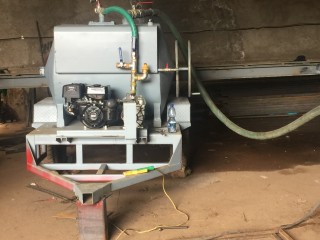Project Results:
Mobile desludging device
Affordable emptying of toilet pits with difficult access
About the project
Project is a follow-up of a pilot in Malawi, in which a mini desludging unit was developed that could work with ‘difficult sludge’ and in areas with ‘difficult access’. This way the many latrines in slum areas could be emptied in a decent way, which would limit the need for rebuilding new latrines when the old ones are full. The Malawi pilot was successful, but the price too high to become attractive for the African market of low-income areas. In this Ethiopia project, the local manufacturing was piloted and the appropriateness for the Ethiopian market tested. Location was Adama, in which a stakeholders group was already built, containing a metal workshop, a local NGO that sensitized the local entrepreneurs, a local technical training institute and the Municipality.
Key results
-
Prototype ready for reproduction (1,000 l sludge tank; 500 l water tank for solidification)
-
Business plan for local production
-
Elaborated business calculations for local pit-emptiers
-
Several enterprises trained
-
Two new orders for prototypes: 1 for Ethiopia and 1 for Bangladesh. VEI Nakuru has shown interest.
Tips for the future
-
There is a need to have simple test protocols.
-
Good service mechanisms in case of failures or break down are essential.
-
For a smooth business, adequate experience in project management, communication and finances is required.
-
Have partners that have entrepreneurial interest to invest in growth
Potential for growth
The business plan is ready and there is interest shown by several NGOs in Ethiopia and abroad. Two orders have already been placed.
Project partners
WASTE, Bole Bible Baptist Church, Yassin Ibrahim Industrial Engineering, Aqua for All/Africa Funded, Practica Foundation, Aba Gedda Enterprise
Period
2016 – February 2019
Location
Adama, EthiopiaLast project updates
Background
The OFDA/USAID Sponsored ESP (Emergency Sanitation Project) (www.emergencysanitationproject.org). WASTE has developed desludging devices and simple effective faecal Sludge treatment methods. WASTE is now entering the demonstration phase of the project and is looking for an opportunity to demonstrate the methods developed. The ESP project ends 31 March 2015. In parallel to this WASTE is working to develop businesses for the devices developed.
One of the potential devices developed is a small desludging devise to empty “difficult” sludge. With the objective to recommend a reliable desludging kit to empty pit latrine sludge in emergency situation, three types of desludging equipment were tested in Blantyre City (Malawi). Parameters such as design, effectiveness and efficiency, ease of use, reliability and durability were evaluated during the testing period of 9 months. After the testing none of the tested equipment proved suitable for removing difficult (thick, semi solid and rubbish loaded) sludge. However after extensive modification and inclusion of two essential processes: fluidizing and fishing out rubbish, the testing found that it is possible to effectively empty difficult sludge under a range of considerations. In addition to the parameters that need to be modified, in order to develop a viable business out of such equipment, the desludging device has to be made locally and by local materials (majority of it) and should be affordable. Locally unavailable materials such as vacuum pumps still can be imported. We found out that the cost of the vacuum pump alone is not expensive. In addition the equipment should be built locally by local people so that maintenance and repair measures can be taken on spot in short period time.
Project Plan
The project identifies the following 5 phases:
Phase 1: Basic research:
In the first phase the concept of the project will be designed
Phase 2: Proof of concept.
In the second phase the concept will be assessed and a pre-feasibility of the market carried out.
Phase 3: Early stage technology development
In the third phase the actual prototypes will be built, tested and demonstrated on difficult sludge (household pit latrines and public toilets) in close collaboration with WASTE and ROM.
Phase 4: Product development
In the fourth phase the focus will be on further analysis of the market of the desludging device (DMU), production and selling of the desludging device. WASTE and B4A (A4A) will work closely with Yassin Industries.
Phase 5: Product marketing
In the fifth phase the product(s) will be manufactured and the first machines sold to potential customers.
Target group
There are two main target groups:
- The main target groups are households who have pit latrines that need to be emptied frequently
- Micro and Small Enterprises (MSEs) that are active in pit emptying service provision
Overview of Goals
The aim of the project is:
1) To support the development of a small desludging device made locally: WASTE, its partners and Yassin Industries will work together to come up with locally produced desludging device developed with local materials (most of it) and local people (with some external support).
2) To support the development of a small desludging device business: Yassin Industries with the support of WASTE and partners promotes the technology, creates business opportunities, develops business and marketing strategies in order to produce and sell the equipment to SMEs which are working on sanitation sector, NGOs, Municipalities e.t.c.



